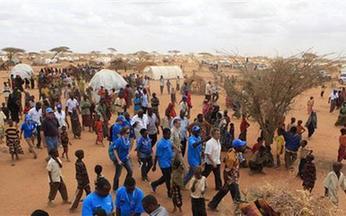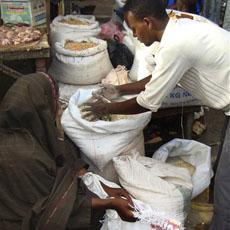
JUNE SIMMS: I'm June Simms.
BARBARA KLEIN: And I'm Barbara Klein with EXPLORATIONS in VOA Special English. Today, we tell about international humanitarian aid. And, we talk to people involved in efforts to help victims of the famine, extremely dry weather and conflict in the Horn of Africa.
(MUSIC)
JUNE SIMMS: The United Nations says about 750,000 people could die from starvation in East Africa. Earlier this year, the UN declared a famine in parts of Somalia. Years of armed conflict have limited the country's supply of food.
Recently, UN officials have said that 3.7 million Somalis are in need of emergency food aid. The UN appealed for over two billion dollars in humanitarian assistance for the Horn of Africa. Over 1.5 billion dollars has been promised.
Last month, the United States said it would provide an additional 23 million dollars to countries in the Horn of Africa. It said 10 million of the 23 million dollars would go directly to Somalia. In all, the United States has promised more than 600 million dollars because of the famine and drought conditions.
BARBARA KLEIN: Other countries are also helping the Horn of Africa. The African Union has promised 350 million dollars in aid to Somalia. The Organization of Islamic Cooperation has made a similar offer. Germany plans to donate 170 million dollars to the area. Britain has promised 115 million dollars in aid, with the European Union offering another 300 million dollars.
Because of conditions in Somalia, many nations and organizations have promised humanitarian and economic assistance. But what does this mean?
International aid is often described as the act of one nation providing resources to another. The aid can be given through goods, such as food, medicines and other supplies. It also could be payments to victims or groups working in the area.
(MUSIC)
JUNE SIMMS: The United States provides economic and humanitarian assistance through the United States Agency for International Development, or USAID. President John F. Kennedy made an order to create the agency in 1961 as part of the Foreign Assistance Act.
Nancy Lindborg is USAID's Assistant Administrator for the Bureau for Democracy, Conflict and Humanitarian Assistance. She says her agency provides financial support to Non Governmental Organizations, also known as NGOs.
NANCY LINDBORG: "USAID operates by providing funds to organizations... both NGOs, local NGOs, international NGOs; UN Agencies and we partner with local and regional governments to provide assistance."
USAID has established a three-part program in Somalia. Ms Lindborg describes how the program works.
NANCY LINDBORG: "We're working on a three part approach to meeting the needs of those in the famine areas. The first is getting in food wherever we can. In particular, thosetherapeutic foods that are easily digestible by young children who are suffering from malnutrition."
BARBARA KLEIN: The foods are two powdered milk products, called F-75and F-100, and a peanut-based food called Plumpy'nut. They are given to starving children because they provide more nutrients and are easy for the body to process.
Nancy Lindborg describes the second part of the program.
NANCY LINDBORG: "We are working very hard on supporting health programs, public health programs. We are very concerned with the coming rains, that there will be additional diseases that are a result of these wetter conditions. And so supporting vaccination programs, especially for measles; we are concerned that cholera and malaria will be on the rise. And this is so urgent for children under five who are already weakened by malnutrition to have access to these health programs as well as to clean water."
Ms Lindborg adds that diseases carried by water can cause serious problems during droughts, famines or natural disasters.
NANCY LINDBORG: "Finally, we are working on programs that increase access to markets. Where there is food available in the markets but it's simply too expensive for families to afford without some assistance programs."
(MUSIC)
JUNE SIMMS: As Nancy Lindborg noted, USAID provides financial support to many NGOs. One such group is the International Rescue Committee. The IRC has been working in the Horn of Africa for many years. It provides economic aid, health care and support for victims of violence based on gender or sex. It also provides assistance to agricultural programs.
Kurt Tjossem is the IRC's Regional Director for the Horn of Africa and East Africa. He says the group has expanded its programs because of the famine conditions.
KURT TJOSSEM: "We have worked in health, providing primary health care and nutrition services. And what we've done in northern Kenya, say for example, is we've ramped up to support the refugees that have crossed in from Somalia to Kenya in the Dadaab area. And we've also provided the Turkana population in northwest with supplementary feeding. In Somalia itself, we've just opened up operations in Mogadishu and are supporting internally displaced populations with primary health care."
Kurt Tjossem says the International Rescue Committee has opened health care centers in Mogadishu. These centers operate in cooperation with Somalia's Health Ministry to provide medicines and medical treatment. The group provides doctors and workers for the health care points.
The IRC also is active in Dadaab at the largest refugee camp in the world.
KURT TJOSSEM: "When we talk about nutrition, what we've done is we have, we run one of the hospitals in the Daadab refugee camp. As part of that there is a stabilization center. And so when malnourished children are identified they are referred to the stabilization center. And we're able through our doctors and nurses to attend to these patients."
The IRC also operates several programs for farmers. In Somalia, about 70 percent of the population is active in farming. During droughts, many farm animals get sick or die. This increases the risks of economic crises during famines.
(MUSIC)
BARBARA KLEIN: One NGO working with farmers in the Horn of Africa is Oxfam America. Oxfam America is part of an alliance of 15 Oxfam groups. The alliance is based in Britain.
Oxfam America does not receive money from USAID or any government. It depends on donations from people in the United States or other countries. The group has also received money from not-for-profit organizations, including the Ford Foundation and the Bill and Melinda Gates Foundation.
Shannon Scribner is Oxfam America's Humanitarian Policy Manager.
SHANNON SCRIBNER: "Before the drought Oxfam was working in Ethiopia and Kenya and working through partners in Somalia. Today we are reaching about one million people affected by the drought and we hope to reach three million with life saving relief. And this relief includes drilling boreholes, building latrines, providing cash to buy food; but also cleaning and rehabilitating existing water sources. We're also working with livestock because a great number of people affected have been pastoralists. This means vaccinating livestock and actually providing new livestock to people who have been affected."
When asked if Oxfam America provides money directly to farmers or buys animals for them, Ms Scribner says they do both.
SHANNON SCRIBER: "We do both. We actually hand out cash for food and sometimes its direct cash if the populations affected are just too weak and too vulnerable. But we also do cash for work, where we'll have a community project such as digging a well and then we'll give cash for food."

JUNE SIMMS: Sometimes international aid fails to reach the target population. The United Nations has been investigating reports that food aid was stolen in Mogadishu. Some reports said businessmen were even selling the aid in markets. Two months ago, witnesses in Mogadishu said seven people were killed when people began stealing food that was sent to famine and drought victims. They said the violence began when men who looked like government soldiers began stealing the food. Reports said pro-government forces guarding the food shot at the men.
BARBARA KLEIN: The movement of foreign aid has historically been difficult to follow. It is not always clear how the money is spent and if the aid is reaching the target communities.
In an effort to solve this problem, two American universities and Development Gateway created a registration system called AidDATA. It was established 10 years ago as a way to register aid activities and improve the public's knowledge of international aid finances.
(MUSIC)
JUNE SIMMS: This program was written by Kim Varzi. Our producer was Mario Ritter. I'm June Simms.
BARBARA KLEIN: And I'm Barbara Klein. Has your nation received aid? Do you know what the aid was used for? If so, we would like to hear from you. Please share your comments on our website: voaspecialenglish.com. Join us again next week for more EXPLORATIONS in VOA Special English.
therapeutic: 治疗的;有益于健康的
malnutrition: 营养失调,营养不良
pastoralist: 牧民;放牧者
US pledges aid for drought-stricken Somali refugees
Water scarcity root of Darfur conflict
UN urges 50% increase in Somalia peacekeepers
Experts defend way of life for herders in East Africa
(来源:VOA 编辑:Rosy)
